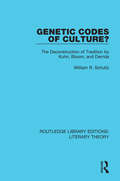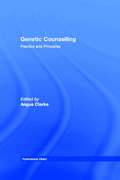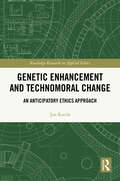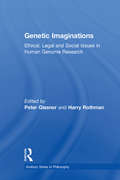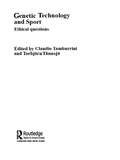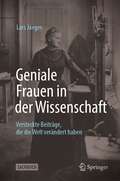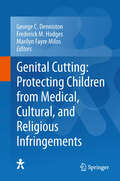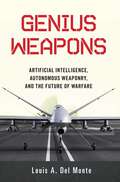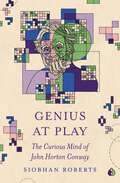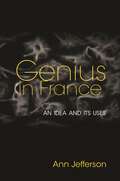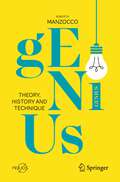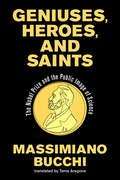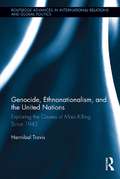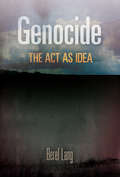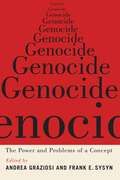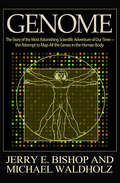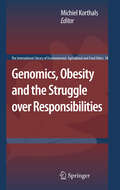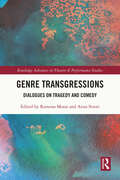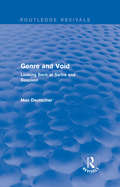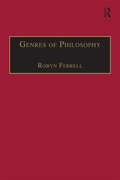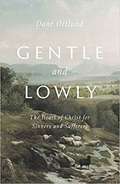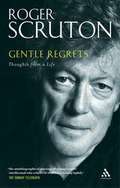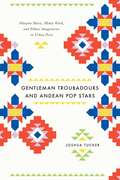- Table View
- List View
Genetic Codes of Culture?: The Deconstruction of Tradition by Kuhn, Bloom, and Derrida (Routledge Library Editions: Literary Theory #24)
by William R. SchultzIn this text, first published in 1994, the author examines the interdisciplinary significance of the theory of science, literature and philosophy according to the figures who achieved prominence in those fields - Kuhn, Bloom and Derrida. Each scholar's theory is discussed in terms of its major concepts, and the book then relates their fields within the context of deconstruction's interdisciplinary movement. This title will be of interest to students of literature and philosophy.
Genetic Codes of Culture?: The Deconstruction of Tradition by Kuhn, Bloom, and Derrida (Routledge Library Editions: Literary Theory)
by William R. SchultzIn this text, first published in 1994, the author examines the interdisciplinary significance of the theory of science, literature and philosophy according to the figures who achieved prominence in those fields - Kuhn, Bloom and Derrida. Each scholar's theory is discussed in terms of its major concepts, and the book then relates their fields within the context of deconstruction's interdisciplinary movement. This title will be of interest to students of literature and philosophy.
Genetic Counselling: Practice and Principles (Professional Ethics)
by Angus ClarkeContributions to this study are drawn both from health professionals engaged in genetic counselling and from observers and critics with backgrounds in law, philosophy, biology, and the social sciences. This diversity will enable health professonals to examine their activities with a fresh eye, and will help the observer-critic to understand the ethical problems that arise in genetic counselling practice, rather than in imaginary encounters. Most examinations of the ethical issues raised by genetics are concerned in a broad sense with the application of new technology to human reproduction. This volume focuses on genetic counselling and screening as such, providing valuable insights for the health professional, social scientist, philosopher, lawyer, and bioethicist.
Genetic Enhancement and Technomoral Change: An Anticipatory Ethics Approach (Routledge Research in Applied Ethics)
by Jon RuedaThis book presents a groundbreaking analysis of the anticipatory ethical issues associated with human genetic enhancement. It provides instructive clarifications for understanding the philosophy and science behind this long-standing bioethical debate and identifies how genetic enhancement may impact the moral codes of future societies.Part 1 examines the historical, conceptual, scientific, and ethical challenges related to human genetic enhancement. The Interlude introduces the emerging philosophical debate on technomoral change. Part 2 addresses reproductive choice, genetic justice, and equal treatment to illustrate how enhancement technologies may alter future social morality. Finally, the book explores the anticipatory governance of genetic enhancement, qualifying the necessity and limitations of public engagement, identifying different types of epistemic and moral uncertainties, and offering meta-normative recommendations for public policy.Genetic Enhancement and Technomoral Change will be of interest to scholars and advanced students interested in bioethics, philosophy of technology, and anticipation studies of science and technology.
Genetic Imaginations: Ethical, Legal and Social Issues in Human Genome Research (Avebury Series in Philosophy)
by Peter Glasner Harry RothmanThe title of this book derives from C. Wright Mills’ classic The Sociological Imagination (Penguin, 1970), in which he sees the essential project of social science as the use of the imagination to 'grasp history and biography and the relations between the two in society'. This enables the social scientist to 'range from the most impersonal and remote transformations to the most intimate features of the human self'. Another of Mills’ concerns was the relationship between 'the personal troubles of the milieu' and 'the public issues of social structure' and these are most acutely illustrated in human genetics, the most personal of the new technologies. The chapters in this volume address these issues through discussions of choice and informed decision-making, risks and hazards, the economic and political organization of new technology, and the public as well as the scientist’s understanding of science. The methods used range from detailed ethnographies, through deconstruction's of text and action, to surveys and interviews.
Genetic Technology and Sport: Ethical Questions (Ethics and Sport)
by Torbjörn Tännsjö Claudio TamburriniWill the genetic design of athletes destroy sport … or will it lead to a new and extraordinary age of athletic achievement? Exploring a new territory in sport and ethics, this edited collection contains some of the best new writing that has emerged from the debates concerning the uses of genetic technologies to improve sport performance. Issues covered include: * gene technology and sports ethics* genetic testing in sports* gene technology and the sporting ethos* gene technology and gender equality in sport. This cutting-edge text is the first on the subject to analyze gender specific questions that arise from genetically modified sport and is likely to provoke further debate in the world of sport and bio-ethics. Contributors include Lincoln Allison, Ruth Chadwick, Arne Ljungqvist, Andy Miah, Christian Munthe, Bengt Saltin, Angela Schnieder and many more.
Geniale Frauen in der Wissenschaft: Versteckte Beiträge, die die Welt verändert haben
by Lars JaegerObwohl Frauen schon früh das wissenschaftliche Denken mitgeprägt haben, sichtbar geworden sind sie fast nie. Dieses Ungleichgewicht setzt sich bis heute fort, auch wenn es aktuell weit mehr Wissenschaftlerinnen gibt als jemals zuvor. Lars Jaeger spannt einen Bogen von der Antike bis heute und porträtiert in essayartigen Einführungen das Leben und Wirken der wohl bedeutendsten weiblichen Naturwissenschaftlerinnen und Mathematikerinnen. Von Hypatia von Alexandria über Émilie du Châtelet und Emmy Noether bis hin zu Lisa Randall, sie alle haben Großes geleistet, die Wissenschaft entscheidend vorangebracht und konnten dennoch oft nicht aus dem Schatten ihrer männlichen Kollegen treten.Neben den spannenden Porträts der einzelnen Wissenschaftlerinnen sowie einer detaillierten und anschaulichen Darstellung ihrer wissenschaftlichen Leistungen beleuchtet dieses Sachbuch auch das Geschlechterverhältnis in der Wissenschaft, das sich nur quälend langsam zugunsten eines fairen Verhältnisses für die Frauen entwickelt.
Genital Cutting: Protecting Children from Medical, Cultural, and Religious Infringements
by Frederick M. Hodges Marilyn Fayre Milos George C. DennistonThis volume contains the proceedings of the 10th International Symposium on Circumcision, Genital Integrity, and Human Rights. Authors are international experts in their fields, and the book contains the most up-to-date information on the issue of genital cutting of infants and children from medical, legal, bioethical, and human rights perspectives.
Genius Weapons: Artificial Intelligence, Autonomous Weaponry, and the Future of Warfare
by Louis A. Del MonteA technology expert describes the ever-increasing role of artificial intelligence in weapons development, the ethical dilemmas these weapons pose, and the potential threat to humanity. Artificial intelligence is playing an ever-increasing role in military weapon systems. Going beyond the bomb-carrying drones used in the Afghan war, the Pentagon is now in a race with China and Russia to develop "lethal autonomous weapon systems" (LAWS). In this eye-opening overview, a physicist, technology expert, and former Honeywell executive examines the advantages and the potential threats to humanity resulting from the deployment of completely autonomous weapon systems. Stressing the likelihood that these weapons will be available in the coming decades, the author raises key questions about how the world will be impacted. Though using robotic systems might lessen military casualties in a conflict, one major concern is: Should we allow machines to make life-and-death decisions in battle? Other areas of concern include the following: Who would be accountable for the actions of completely autonomous weapons--the programmer, the machine itself, or the country that deploys LAWS? When warfare becomes just a matter of technology, will war become more probable, edging humanity closer to annihilation? What if AI technology reaches a "singularity level" so that our weapons are controlled by an intelligence exceeding human intelligence? Using vivid scenarios that immerse the reader in the ethical dilemmas and existential threats posed by lethal autonomous weapon systems, the book reveals that the dystopian visions of such movies as The Terminator and I, Robot may become a frightening reality in the near future. The author concludes with concrete recommendations, founded in historical precedent, to control this new arms race.
Genius at Play: The Curious Mind of John Horton Conway
by Siobhan RobertsA multifaceted biography of a brilliant mathematician and iconoclastA mathematician unlike any other, John Horton Conway (1937–2020) possessed a rock star&’s charisma, a polymath&’s promiscuous curiosity, and a sly sense of humor. Conway found fame as a barefoot professor at Cambridge, where he discovered the Conway groups in mathematical symmetry and the aptly named surreal numbers. He also invented the cult classic Game of Life, a cellular automaton that demonstrates how simplicity generates complexity—and provides an analogy for mathematics and the entire universe. Moving to Princeton in 1987, Conway used ropes, dice, pennies, coat hangers, and the occasional Slinky to illustrate his winning imagination and share his nerdish delights. Genius at Play tells the story of this ambassador-at-large for the beauties and joys of mathematics, lays bare Conway&’s personal and professional idiosyncrasies, and offers an intimate look into the mind of one of the twentieth century&’s most endearing and original intellectuals.
Genius in France: An Idea and Its Uses
by Ann JeffersonThis engaging book spans three centuries to provide the first full account of the long and diverse history of genius in France. Exploring a wide range of examples from literature, philosophy, and history, as well as medicine, psychology, and journalism, Ann Jefferson examines the ways in which the idea of genius has been ceaselessly reflected on and redefined through its uses in these different contexts. She traces its varying fortunes through the madness and imposture with which genius is often associated, and through the observations of those who determine its presence in others.Jefferson considers the modern beginnings of genius in eighteenth-century aesthetics and the works of philosophes such as Diderot. She then investigates the nineteenth-century notion of national and collective genius, the self-appointed role of Romantic poets as misunderstood geniuses, the recurrent obsession with failed genius in the realist novels of writers like Balzac and Zola, the contested category of female genius, and the medical literature that viewed genius as a form of pathology. She shows how twentieth-century views of genius narrowed through its association with IQ and child prodigies, and she discusses the different ways major theorists—including Sartre, Barthes, Derrida, and Kristeva—have repudiated and subsequently revived the concept.Rich in narrative detail, Genius in France brings a fresh approach to French intellectual and cultural history, and to the burgeoning field of genius studies.
Genius: Theory, History and Technique (Springer Praxis Books)
by Roberto ManzoccoGenius is a fascinating topic. Everyone has an opinion on it, but not a lot of clarity. Much has been written on the subject - biographies, autobiographies, technical books, popular science books, and practical manuals - but genius in all of its dimensions has yet to be addressed. This book seeks to remedy that. What follows is a work of significant breadth that hopes to facilitate a nuanced popular understanding of the definition of genius, examining all of the main theories and approaches regarding the nature and origin of brilliance, the cognitive path that geniuses follow, and the difference that exists between “geniuses” on one side and “normal people” on the other. Pragmatic indications surrounding this issue are also examined, regarding such questions as: is it possible to become a genius or is genius innate? If it is possible, what is the path – no doubt long and difficult – that one must take? Is there a method for becoming a genius that can be taught and learned? This book will appeal to anyone who has ever contemplated great ideas and works and wondered how they came into being.
Geniuses, Heroes, and Saints: The Nobel Prize and the Public Image of Science
by Massimiano BucchiA rich account of the world&’s leading science prize told through the lives it has changed, the controversies it has generated, and the impact it has made on the public.In a world where the work of science largely remains inscrutable to the general public, the Nobel Prize confers a degree of intelligibility like no other honor. Our best-known and most prestigious award for individual scientific achievement, the Nobel attaches a brilliant face to a story of profound discovery, making moving headlines. In Geniuses, Heroes, and Saints, Massimiano Bucchi tells an equally compelling story of the Nobel&’s transformation of science into an epic pursuit legible both to the field and to the public, bound up with the currents of historical change.Three main narratives characterize the Nobel. The scientist as genius, portrayed as a creative visionary, an exceptional intellect reflecting a solitary and romantic ideal of great communicative impact. The scientist as national hero acts as a surrogate of competition among nations in a peaceful, rational contest. The scientist as saint shines with moral exceptionality, a figure worthy of celebration and worship, known for virtues such as modesty, humility, and total dedication, body and soul, to the scientific enterprise. Whether the recipient was Albert Einstein or a countryside doctor toiling for years in obscurity, whether the prize was worthily given or awarded to work later disproved, or whether we even remember the honorees today, the Nobel defined the image of science in the twentieth century, Bucchi shows, an image that still lives in all sorts of fascinating ways today.
Genocide, Ethnonationalism, and the United Nations: Exploring the Causes of Mass Killing Since 1945 (Routledge Advances in International Relations and Global Politics)
by Hannibal TravisGenocide, Ethnonationalism, and the United Nations examines a series of related crises in human civilization growing out of conflicts between powerful states or empires and indigenous or stateless peoples. This is the first book to attempt to explore the causes of genocide and other mass killing by a detailed exploration of UN archives covering the period spanning from 1945 through 2011. Hannibal Travis argues that large states and empires disproportionately committed or facilitated genocide and other mass killings between 1945 and 2011. His research incorporates data concerning factors linked to the scale of mass killing, and recent findings in human rights, political science, and legal theory. Turning to potential solutions, he argues that the concept of genocide imagines a future system of global governance under which the nation-state itself is made subject to law. The United Nations, however, has deflected the possibility of such a cosmopolitical law. It selectively condemns genocide and has established an institutional structure that denies most peoples subjected to genocide of a realistic possibility of global justice, lacks a robust international criminal tribunal or UN army, and even encourages "security" cooperation among states that have proven to be destructive of peoples in the past. Questions raised include: What have been the causes of mass killing during the period since the United Nations Charter entered into force in 1945? How does mass killing spread across international borders, and what is the role of resource wealth, the arms trade, and external interference in this process? Have the United Nations or the International Criminal Court faced up to the problem of genocide and other forms of mass killing, as is their mandate?
Genocide: The Act as Idea (Pennsylvania Studies in Human Rights)
by Berel LangThe term "genocide"--"group killing"--which first appeared in Raphael Lemkin's 1944 book, Axis Rule in Occupied Europe, had by 1948 established itself in international law through the United Nations Convention on the Prevention and Punishment of the Crime of Genocide. <P><P>Since then the charge of genocide has been both widely applied but also contested. In Genocide: The Act as Idea, Berel Lang examines and illuminates the concept of genocide, at once articulating difficulties in its definition and proposing solutions to them. In his analysis, Lang explores the relation of genocide to group identity, individual and corporate moral responsibility, the concept of individual and group intentions, and the concept of evil more generally. <P><P>The idea of genocide, Lang argues, represents a notable advance in the history of political and ethical thought which proposed alternatives to it, like "crimes against humanity," fail to take into account.
Genocide: The Power and Problems of a Concept
by Andrea Graziosi and Frank E. SysynSince the 1980s the study of genocide has exploded, both historically and geographically, to encompass earlier epochs, other continents, and new cases. The concept of genocide has proved its worth, but that expansion has also compounded the tensions between a rigid legal concept and the manifold realities researchers have discovered. The legal and political benefits that accompany genocide status have also reduced complex discussions of historical events to a simplistic binary – is it genocide or not? – a situation often influenced by powerful political pressures.Genocide addresses these tensions and tests the limits of the concept in cases ranging from the role of sexual violence during the Holocaust to state-induced mass starvation in Kazakh and Ukrainian history, while considering what the Armenian, Rwandan, and Burundi experiences reveal about the uses and pitfalls of reading history and conducting politics through the lens of genocide. Contributors examine the pressures that great powers have exerted in shaping the concept; the reaction Raphaël Lemkin, originator of the word “genocide,” had to the United Nations’ final resolution on the subject; France’s long-held choice not to use the concept of genocide in its courtrooms; the role of transformative social projects and use of genocide memory in politics; and the relation of genocide to mass violence targeting specific groups.Throughout, this comprehensive text offers innovative solutions to address the limitations of the genocide concept, while preserving its usefulness as an analytical framework.
Genome: The Story of the Most Astonishing Scientific Adventure of Our Time—the Attempt to Map All the Genes in the Human Body (Saber Mas Ser.)
by Jerry E. Bishop Michael WaldholzAn &“invaluable [and] highly readable&” account of the quest to map our DNA, the blueprint for life—and what it means for our future ( The Philadelphia Inquirer).Genome tells the story of the most ambitious scientific adventure of our time. By gradually isolating and identifying all the genes in the human body—the blueprint for life—scientists are closing in on the ability to effectively treat and prevent nearly every disease that strikes man, from muscular dystrophy, diabetes, and cancer to heart ailments, alcoholism, and even mental illness. Such discoveries will change the course of human life. At the same time, they raise profound ethical questions that have tremendous implications: Can insurance companies demand genetic tests to determine who poses a health risk? Should parents be able to choose their baby&’s sex or eye color? Will employers screen out potential employees who are genetically susceptible to occupational health problems? An exciting true tale of discovery that is revolutionizing our world, Genome helps us understand our future.
Genomics, Obesity and the Struggle over Responsibilities
by Michiel KorthalsThis volume addresses the overlapping aspects of the fields of genomics, obesity and (non-) medical ethics. It is unique in its examination of the implications of genomics for obesity from an ethical perspective. Genomics covers the sciences and technologies involved in the pathways that DNA takes until the organism is completely built and sustained: the range of genes (DNA), transcriptor factors, enhancers, promoters, RNA (copy of DNA), proteins, metabolism of cell, cellular interactions, organisms. Genomics offers a holistic approach, which, when applied to obesity, can have surprising and disturbing implications for the existing networks tackling this phenomenon. The ethical concerns and consideration presented are inspired by the interaction between the procedural perspective emphasizing the necessity of consultative and participatory organizational relationships in the new gray zones between medicine and food, and the substantive perspective that both cherishes individual autonomy and embeds it in socio-cultural contexts.
Genre Transgressions: Dialogues on Tragedy and Comedy (ISSN)
by Ramona Mosse Anna StreetThis collection gathers a set of provocative essays that sketch innovative and interdisciplinary approaches to Genre Theory in the 21st century. Focusing on the interaction between tragedy and comedy, both renowned and emerging scholarly and creative voices from philosophy, theater, literature, and cultural studies come together to engage in dialogues that reconfigure genre as social, communal, and affective.In revisiting the challenges to aesthetic categorization over the course of the 20th century, this volume proposes a shift away from the prescriptive and hierarchical reading of genre to its crucial function in shaping thought and enabling shared experience and communication. In doing so, the various essays acknowledge the diverse contexts within which genre needs to be thought afresh: media studies, rhetoric, politics, performance, and philosophy.
Genre Transgressions: Dialogues on Tragedy and Comedy (Routledge Advances in Theatre & Performance Studies)
by Ramona Mosse Anna StreetThis collection gathers a set of provocative essays that sketch innovative and interdisciplinary approaches to Genre Theory in the 21st century. Focusing on the interaction between tragedy and comedy, both renowned and emerging scholarly and creative voices from philosophy, theater, literature, and cultural studies come together to engage in dialogues that reconfigure genre as social, communal, and affective. In revisiting the challenges to aesthetic categorization over the course of the 20th century, this volume proposes a shift away from the prescriptive and hierarchical reading of genre to its crucial function in shaping thought and enabling shared experience and communication. In doing so, the various essays acknowledge the diverse contexts within which genre needs to be thought afresh: media studies, rhetoric, politics, performance, and philosophy.
Genre and Void: Looking Back at Sartre and Beauvoir (Routledge Revivals)
by Max DeutscherThis book was first published in 2003: Developing a reading of some of Beauvoir's and Sartre's most influential writings in philosophy, Max Deutscher explores contemporary philosophy in the light of the phenomenological tradition within which Being and Nothingness and The Second Sex occurred as striking events operating on the border of the modern and the post-modern. Deutscher traces the shifts of genre that produce their gendered philosophies, and responds in terms of contemporary experience to the mood and the arguments of their works. Drawing upon the writings of two contemporary critics in particular - Michele Le DÅ“uff and Luce Irigaray - Deutscher reworks this part of philosophy's history in order to advance thinking in contemporary philosophy, generate renewed philosophical reflection on consciousness, freedom and one's relation to others, and to return a look still cast in our direction from an earlier time.
Genres of Philosophy
by Robyn FerrellPhilosophy is textual - it is written and it is read - yet today much of philosophy regards itself as a kind of science, sometimes reducing itself to a species of intellectual bureaucracy. It is important to see these qualities as having their own aesthetic. Even realism is a genre. The aesthetic of the empirical and the bureaucratic, the aesthetic of the rhapsodic and of the clinical ... in each of these the genres of philosophy are as creative as they ever were. They are productive of worlds, not only worlds of thought, but 'real worlds' enabled by the technological and other changes that thought has envisaged. This book explores genres through the history of philosophy, providing new ways of thinking about philosophical writing. Exploring a wide range of both European and analytic philosophers and their works - including Plato, Aristotle, Hume, Kant, Nietzsche, Deleuze, Wittgenstein, Derrida and Rorty - Genres of Philosophy explores the reading and writing of philosophers who themselves read and write, revealing the textual relation to the history of philosophy. While the focus of the book is in aesthetics, Ferrell reveals that the interest in philosophy's writing turns out to be a metaphysical question. The question becomes one of evaluating the ontological basis for writing - its subject and its means of expression - within a world of thought which is presently captivated by a particular aesthetic, that of the empiricist. Presenting fresh readings of classic texts in aesthetics, and offering an original approach to the question of philosophical writing, this unique analysis will prove of particular interest to readers in European philosophy, the history of philosophy, aesthetics, and literary studies.
Gentle And Lowly: The Heart Of Christ For Sinners And Sufferers
by Dane C. OrtlundChristians can easily feel that Jesus is perpetually disappointed and frustrated, maybe even close to giving up on them. They know what Christ has done for them―but who is he? How does he feel about his people amid all their sins and failures? In Matthew 11, Jesus describes himself as “gentle and lowly in heart,” longing for his people to find rest in him. This book reflects on his words, diving deep into Bible passages that speak of Christ’s affections for sinners and encouraging believers as they journey, weary and faltering, toward heaven.
Gentle Regrets: Thoughts from a life
by Roger ScrutonIn this book the author takes us on a few autobiographical excursions and shares in a moving account the ways in which life brought him to think what he thinks, and to be what he is.
Gentleman Troubadours and Andean Pop Stars: Huayno Music, Media Work, and Ethnic Imaginaries in Urban Peru (Chicago Studies In Ethnomusicology Ser.)
by Joshua TuckerExploring Peru’s lively music industry and the studio producers, radio DJs, and program directors that drive it, Gentleman Troubadours and Andean Pop Stars is a fascinating account of the deliberate development of artistic taste. Focusing on popular huayno music and the ways it has been promoted to Peru’s emerging middle class, Joshua Tucker tells a complex story of identity making and the marketing forces entangled with it, providing crucial insights into the dynamics among art, class, and ethnicity that reach far beyond the Andes. Tucker focuses on the music of Ayacucho, Peru, examining how media workers and intellectuals there transformed the city’s huayno music into the country’s most popular style. By marketing contemporary huayno against its traditional counterpart, these agents, Tucker argues, have paradoxically reinforced ethnic hierarchies at the same time that they have challenged them. Navigating between a burgeoning Andean bourgeoisie and a music industry eager to sell them symbols of newfound sophistication, Gentleman Troubadours and Andean Pop Stars is a deep account of the real people behind cultural change.
